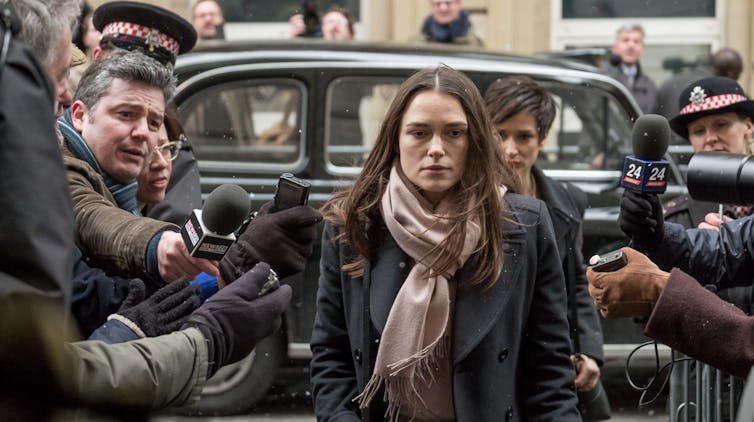Film and Books: The butterfly effect
Have you become cynical about love? Do you think there’s nowhere to meet anyone anymore, that men are still boys, that women want commitment and children and big weddings—all promised on date three? Golly, why even bother?
What to do? I have an odd answer: go to a movie, read a good book. Do both. You will be changed and that change will have a ripple effect. The butterfly effect. Edward Lorenz, who worked on the physics concept, the chaos theory, gets the credit for this phrase entering our vernacular. I’m no physicist but here’s my way to understand it: The unheard move of that delicate wing whispers on the wind. It ripples and is heard somewhere else. Some say a flick of the wing can start a hurricane.
Come with me now as I’m off to the flicks with a book in my pocket. To understand me, and maybe you don’t care, but keep reading anyway: I love the romantic comedy (aka Rom-Com) and Vladimir Nabokov’s memoir Speak, Memory that is full of his love of the butterfly. I love the paradox: stuff like what I just asserted that doesn’t seem to fit together but does—or might.
When my heart was broken, a long story that I documented in a blog and a memoir, I went to the Rom-Com for wisdom. Now that my heart is healed, I still love them, but now I look for movies that cross the genre boundary and I reread Lolita, the much banned and misunderstood novel, for hope.
The best films cross the boundary of genre, as in Rom-Com, and become literature as in Lolita. When that happens I believe in LOVE, yeah, the all caps kind.
Let’s define one term here. Hitch, Something’s Gotta Give, French Kiss are, for the more literary among you who wouldn’t dare venture to one of these, Rom-Coms. Here’s how they work: two cynics meet, neither believes love works and one or both have been hurt or screwed by believing the open heart is a good thing. So one, or in the case of Hitch, both have shut down. The fairy tale ending doesn’t exist and they both know it. Familiar dilemma?
The thing about great flicks, the ones that cross the boundary to, let’s just call it film-literature, is that the subject is almost always, even if not fully apparent, about the paradoxes of love.
Two movies worth seeking out prove this: The Debt and Beginners.
The Debt, billed as a thriller, was not critically well reviewed by the heavy hitters. I disagree. It’s a daring story that uncovers the lives of three retired Israeli secret agents and provides an original slant on the difficult subject of the Holocaust. The power of this film lies in its cast, both those in flashback and those in present action, who reflect on each other.
John Madden directed. You might remember him from Shakespeare in Love, a flick he directed and that some have called a Rom-Com romp. I think it’s original, full of panache, literary.
In The Debt, Madden ensures that the viewer lives the agents’ experience through the struggle of layered conflict. In this case, the power of what remains withheld is a lie. The heavy-hitting critics say the movie wears you out, but that’s John Madden’s point: in the dark theater I lived the experience of the conflict as Madden entwined past and present, the way memory works. We see the same story retold in the main character’s struggle, the role played forcefully by Helen Mirren in the film’s present action and vulnerably in her memory by Jessica Chastain. Memory, in our unconscious joins past and present by revisiting the past over and over again. Its butterfly wings change us if we listen to the unheard whisper.
I was changed by this film because the key conflict, the ethical problem of the lie, is complicated by the paradox of love, love between two men and one woman, love between the one woman and the man she truly loves and her love for the child fathered by one of the two.
Beginners did not play widely when first released but garnered an Oscar for Christopher Plummer. Netflix it. I loved it so much I saw it twice. This flick, written and directed by Mike Mills, operates with the deftness and concreteness of a poem. The performances are terrific, but it is the screenplay that stuns. The story and the editing work a bit like The Debt, back and forth through memory.
Ewan McGregor tenderly plays the main character whose father, played with candor and wit by Christopher Plummer, came out, “I’m gay,” after his wife died. We know right off the bat that this character has also died. McGregor’s character can’t seem to find love. His parents’ marriage circles back and forth in memory of childhood. He’s overcome by grief. We watch him care for the dying and paradoxically vibrant- living, loving father.
The movie is transformative because the characters, even Arthur, the Jack Russell terrier, are specific, non-generic. We know their conflicts and we know that love is the answer.
Both these films cross the boundaries of genre. Is The Debt a thriller? Can Beginners even be defined? Both flicks read like literature because the viewer is changed. And the territory of both movies is love.
Love defines us, who we are, who we wish to be, when we fall short, and when we succeed in the deeply human journey we call life.
Love is the chaos theory when you’re trying to find it and sometimes when you’re in it, as I well know.
The book in my pocket is Lolita. The blub on the back of my copy reads: “The only convincing love story of our century.” —Vanity Fair.
Nabokov closes the novel, a book once banned for its pederasty, with a prose elegy to the voices of children at play and to the unheard voice of Lolita from that concord. Nabokov’s flawed hero, for lack of a better term, speaks at the end of the novel of the children’s “vapor of blended voices,” of the “spurt of vivid laughter, or the crack of a bat, or clatter of a toy wagon” and his elegy on the sounds of childhood ends this way:
I stood listening to that musical vibration from my lofty slope, to those flashes of separate cries with a kind of demure murmur for background, and then I knew that the hopelessly poignant thing was not Lolita’s absence from my side, but the absence of her voice from the concord.
Nabokov, who loved the butterfly, has made the point that love corrupted destroys the child and we must be child-like to love passionately, deeply.
The ripple effect of the unheard broken wing does not whisper. It screams.
If you are discouraged by love, if your heart has been broken, if you’ve become cynical about finding love, know you can be changed by a great film or book. You will walk on the street anew and the flick of your wing will sing. Someone will hear.
Trailers for The Debt and Beginners follow:
The Debt:
Beginners
Mary L. Tabor is the author of Who by Fire a novel, the memoir (Re)Making Love and The Woman Who Never Cooked: Short Stories. Find out more at http://maryltabor.com
This article is brought to you by the author who owns the copyright to the text.
Should you want to support the author’s creative work you can use the PayPal “Donate” button below.
Your donation is a transaction between you and the author. The proceeds go directly to the author’s PayPal account in full less PayPal’s commission.
Facts & Arts neither receives information about you, nor of your donation, nor does Facts & Arts receive a commission.
Facts & Arts does not pay the author, nor takes paid by the author, for the posting of the author's material on Facts & Arts. Facts & Arts finances its operations by selling advertising space.














